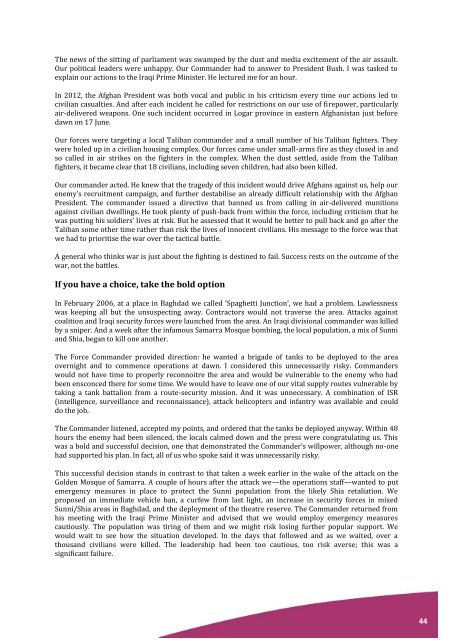Issue No 198 2015
198 2015 Nov_Dec
198 2015 Nov_Dec
You also want an ePaper? Increase the reach of your titles
YUMPU automatically turns print PDFs into web optimized ePapers that Google loves.
The news of the sitting of parliament was swamped by the dust and media excitement of the air assault.<br />
Our political leaders were unhappy. Our Commander had to answer to President Bush. I was tasked to<br />
explain our actions to the Iraqi Prime Minister. He lectured me for an hour.<br />
In 2012, the Afghan President was both vocal and public in his criticism every time our actions led to<br />
civilian casualties. And after each incident he called for restrictions on our use of firepower, particularly<br />
air-delivered weapons. One such incident occurred in Logar province in eastern Afghanistan just before<br />
dawn on 17 June.<br />
Our forces were targeting a local Taliban commander and a small number of his Taliban fighters. They<br />
were holed up in a civilian housing complex. Our forces came under small-arms fire as they closed in and<br />
so called in air strikes on the fighters in the complex. When the dust settled, aside from the Taliban<br />
fighters, it became clear that 18 civilians, including seven children, had also been killed.<br />
Our commander acted. He knew that the tragedy of this incident would drive Afghans against us, help our<br />
enemy’s recruitment campaign, and further destabilise an already difficult relationship with the Afghan<br />
President. The commander issued a directive that banned us from calling in air-delivered munitions<br />
against civilian dwellings. He took plenty of push-back from within the force, including criticism that he<br />
was putting his soldiers’ lives at risk. But he assessed that it would be better to pull back and go after the<br />
Taliban some other time rather than risk the lives of innocent civilians. His message to the force was that<br />
we had to prioritise the war over the tactical battle.<br />
A general who thinks war is just about the fighting is destined to fail. Success rests on the outcome of the<br />
war, not the battles.<br />
If you have a choice, take the bold option<br />
In February 2006, at a place in Baghdad we called ‘Spaghetti Junction’, we had a problem. Lawlessness<br />
was keeping all but the unsuspecting away. Contractors would not traverse the area. Attacks against<br />
coalition and Iraqi security forces were launched from the area. An Iraqi divisional commander was killed<br />
by a sniper. And a week after the infamous Samarra Mosque bombing, the local population, a mix of Sunni<br />
and Shia, began to kill one another.<br />
The Force Commander provided direction: he wanted a brigade of tanks to be deployed to the area<br />
overnight and to commence operations at dawn. I considered this unnecessarily risky. Commanders<br />
would not have time to properly reconnoitre the area and would be vulnerable to the enemy who had<br />
been ensconced there for some time. We would have to leave one of our vital supply routes vulnerable by<br />
taking a tank battalion from a route-security mission. And it was unnecessary. A combination of ISR<br />
(intelligence, surveillance and reconnaissance), attack helicopters and infantry was available and could<br />
do the job.<br />
The Commander listened, accepted my points, and ordered that the tanks be deployed anyway. Within 48<br />
hours the enemy had been silenced, the locals calmed down and the press were congratulating us. This<br />
was a bold and successful decision, one that demonstrated the Commander’s willpower, although no-one<br />
had supported his plan. In fact, all of us who spoke said it was unnecessarily risky.<br />
This successful decision stands in contrast to that taken a week earlier in the wake of the attack on the<br />
Golden Mosque of Samarra. A couple of hours after the attack we—the operations staff—wanted to put<br />
emergency measures in place to protect the Sunni population from the likely Shia retaliation. We<br />
proposed an immediate vehicle ban, a curfew from last light, an increase in security forces in mixed<br />
Sunni/Shia areas in Baghdad, and the deployment of the theatre reserve. The Commander returned from<br />
his meeting with the Iraqi Prime Minister and advised that we would employ emergency measures<br />
cautiously. The population was tiring of them and we might risk losing further popular support. We<br />
would wait to see how the situation developed. In the days that followed and as we waited, over a<br />
thousand civilians were killed. The leadership had been too cautious, too risk averse; this was a<br />
significant failure.<br />
44


